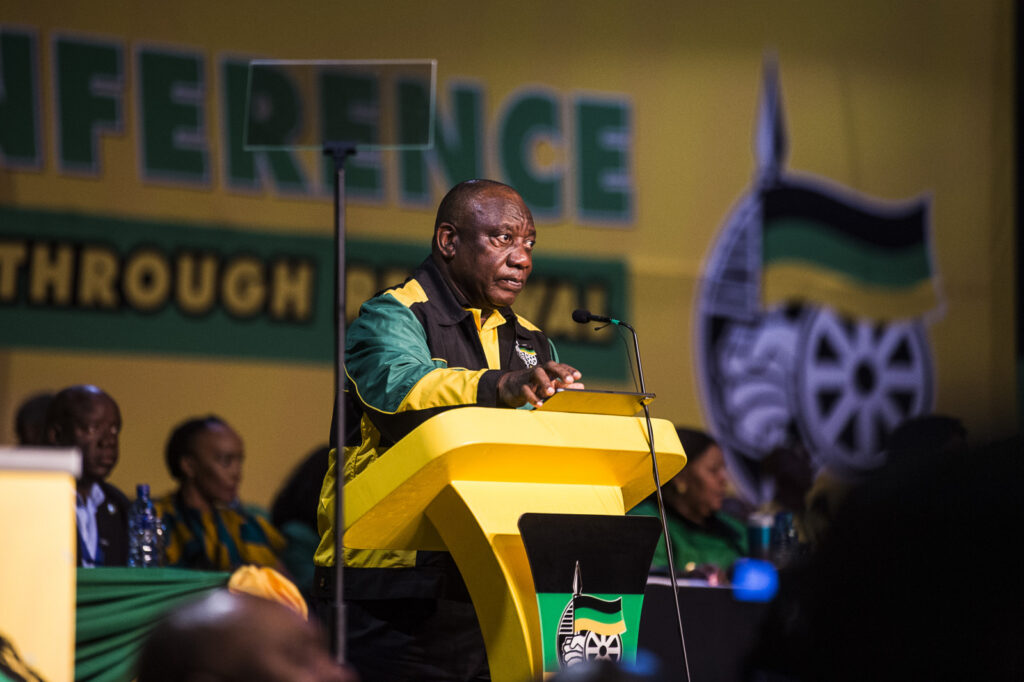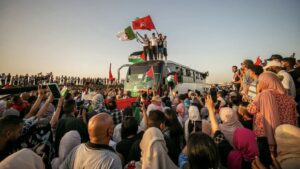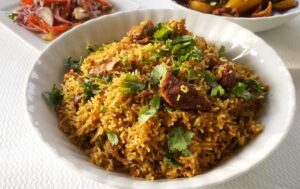
[Photo: M&G]
Shouldn’t Muslim leaders, clerics and activists ask why the fervour for Palestine was not channelled popularly in any progressive way, writes Ebrahim Rasool.
As someone who has had quite an exposure to election management—from being a leader in boycotting the tricameral elections to leading the ANC Western Cape elections from 1994 to sitting out the Zuma era and getting involved again in the Ramaphosa era—2024’s elections have much that is familiar and enough that is a shock.
The familiar is the downward trajectory of the ANC since Polokwane 2007 (with early warnings in the Metros), the denialism and/or incapacity within the ANC to deal decisively with the root causes, and the growing impact of insurgent parties from within the ANC on the political landscape. The shock this time is the sheer magnitude of the insurgent MK Party inspired by Jacob Zuma that has almost single-handedly reduced the ANC from 57% to 40%, from dominant governing party to one searching for coalition partners, from leading 8 provinces to now being rural-dominant, and from being architect – albeit flawed – of its own future to being dependent on others for a future that may well be existentially challenged if it makes the wrong moves in this crisis.
My experience in the Western Cape Elections taught us a useful set of metaphors by which to understand where we stood electorally, what the task was for us, and what we needed to do to get out of the position we were in and to advance. We were never in the dream scenario as a Western Cape ANC of having over 55% of the vote (the healthy body), but in 2004, with 46% and in government, we deemed ourselves to be outpatients (40%-49%) that needed regular treatment about winning trust and then winning votes; after the 1994 election defeat by the National Party when we had 33% of the vote, we treated this zone as High Care (30%-40%) where a patient requires fundamental surgery and care; and during the Zuma years, the ANC in the Western Cape went into ICU at about the mid 20% zone. It’s anyone’s guess what metaphor would apply to a party under 20%.
I raise these so that we can understand where the ANC as a whole (40%), with 3 lost Provinces (17% to 34%), 3 marginal Provinces (around 50%), and 3 clear Provinces (above 60%) is located and what needs to be done. In understanding this, we must discern what the electorate has told us. Grievance and unhappiness abound in a land of poverty and inequality, a society of insecurity and impunity; families wracked by unemployment and pathology, and a government that appears socially distant and economically elitist. This IS the reality for our people. How this APPEARS to the people depends on the tune played by any piper – what is the narrative? ‘Foreigners are taking our jobs!’ ‘Life is better under 2 white men.’ ‘Black leaders can only be corrupt.’ ‘The Zulu martyr bears our cross.’ ‘Taking back the land is the solution to all problems.’
At this point, only the insurgents are satisfied: MK has its moment of vengeance and achieved its objective of disrupting the ANC establishment. It has no objective beyond this because it has not even prepared a manifesto. If anything, it wants a presidential pardon for the corruption of its members. At this point, the ancient regime, the DA and its backers can feel that they have stalled the transformation project and now have the influence to ensure that governance moves more to the right, that it is growth-friendly, and that it has become the uncontested voice of its minority base. These are the ones who have gained from the election.
It is the ANC, the IFP and the EFF that have lost ground in this election. The ANC has lost most significantly in terms of its 30-year hold on governance across SA; it has lost a significant part of its urban base, it has forfeited 3 Provinces, and it stands at an ideological and political crossroads. The ANC may also feel aggrieved that at the moment it started to regain its moral anchor, it got punished by the electorate simply because it did not give itself enough time to regain the trust it squandered, and that would have ensured that its amputation of the corrupt and its strong stand on Palestine would have been sown on more fertile soil. Yet, the ANC remains at the epicentre of South African politics and governance and so must now become the prime mover of the coalition politics that awaits the country.
After the 1994 defeat of the ANC in the Western Cape, the ANC fragmented at the hand of the Politics of Recrimination: Coloured people were blamed for voting overwhelmingly National Party; Africans were accused of being too assertive; the rural accused the urban; the left said the ANC was not radical enough; …. Today the grounds for recrimination are rife: do we punish a youth demographic simply because billions of rands of investment in bursaries still saw them flocking in long lines at universities to vote against the ANC, whether for SRC or government? Do we blame the vulnerable who didn’t vote for ANC despite the R23 billion monthly spend on social security? Do we see suspiciously the residents of townships who voted against the ANC having left their RDP house where there is water and sanitation? Do we turn on Muslims who, despite ANC support for Palestine, still voted DA?
Muslim vote
It is the last recrimination that needs some airing. Firstly, it is the ANC’s deep-rooted values and long-standing solidarity that elicited its ICJ intervention, and not simply its need for the Muslim vote. In fact, the Muslim vote was coherent and telling only once in 2004 when the ANC won the Western Cape. It did not vote for Nelson Mandela in 1994 and went lock, stock and barrel to the DA in 2009. Even now, after the fervour of Palestine, it can be said from a cursory glance at Muslim-heavy voting station results that firstly, there was no compulsion by Muslims to vote ANC in KZN – they had other fears and considerations; secondly, it appears that Gauteng Muslims did give the ANC a majority in most suburbs; and in the Western Cape, a reduced majority of Muslims voted DA, with the rest splitting their votes between apathy (stay away), a halfway house (other parties like Al Jamaah), and the ANC. This is in defiance of clear calls not to vote DA and suggestions to return the ruling party to power in the interests of the Palestinian cause.
Yet, the truth in the Western Cape is somewhere in the middle. The majority of Muslims did vote DA, and there was an increase of support for the ANC and others, but the DA vote was not to the extent that DA and Zionist gloaters exaggerate and certainly not as an endorsement of genocide or as a negation of the ANC’s case in the ICJ.
The reasons for this vote are complex. Muslims have more identities than Palestine – they are also citizens. Muslims have more fears than Israeli genocide – some fear corruption, service decline or even black people more. Muslims have more values than only opposing Palestinians being massacred – they can be more attached to being anti-LGBT and anti-corruption.
Should it not be the task of a political movement to ask itself what it could have done better to win trust? Should it not be the task of Muslim clerics and leaders to ask why its calls were ignored? Should it not be the task of activists to understand why its fervour for Palestine was not channelled popularly in any progressive way?











